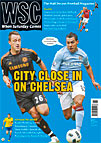 Simon Tyres rises early on a Sunday morning to review the football-related programming
Simon Tyres rises early on a Sunday morning to review the football-related programming
Sunday morning television is an odd thing. If it’s not soap omnibuses or Tim Lovejoy operating a whisk, trying desperately to make out that this is how he saw his career going all along, it’s ethical debate shows in the old God slot featuring panellists chosen for their lightness towards universal tolerance. Turning on BBC1 to find Terry Christian taking the moral high ground, any moral high ground, makes you wonder if the last two decades of broadcasting progress were in vain.
Sky Sports’ alternative is a morning’s worth of roundabout talk on things that have long been covered already. Sunday Supplement was set up to give the newly acquired Jimmy Hill something to do once it had become clear he wasn’t going to be let within gesticulating distance of Richard Keys. Since Hill left in 2007 the programme filled out its panel with journalists and became a sort of self-informed talking shop, where the same points – if Wenger has lost it, Liverpool’s ownership, a distrust of Capello and Man City – are discussed for ten minutes every week to no conclusion. We’re regularly reminded that a podcast is available, just in case your journey to work doesn’t feel long enough.
Following that, Goals On Sunday is now under the stewardship of fresh-faced blank canvas Ben Shepherd, who you may know from being not quite the most respected presenter on T4 and then GMTV. With Keys and Jeff Stelling now in his sights, he’s ended up on the highlights programme that assumes you’ve already seen the previous day’s highlights, where his job is to fill the occasional conversational gaps left by Chris Kamara.
For most of the time Kamara is football’s performing bear, relied upon to deliver excitable commentaries, non-sequiturs and a bit of singing if required. It’s surprising he hasn’t cashed in on his reputation and taken up a showbiz agent for minor celebrity roles. Turning up to open new provincial superstores, say, brandishing large scissors as a small crowd waits expectantly for his in-character announcement: “I proudly declare the opening of this store… unbelievable!”
It’s on Sunday mornings that he gets to break loose, pitching himself as the upholder of football justice while continually rubbing his legs and rocking back and forth as if gripped by demons. Kamara’s ability to find almost all of the previous day’s major refereeing decisions wanting, with his voice going up a couple of notches every time, would be laudable were it not slightly scary. It’s as if he can’t believe referees could be so foolish as to not send at least two players off in every game and will browbeat the studio guests into line should they disagree.
Both Goals On Sunday and Match of the Day 2 welcomed David Ginola as a guest in September. Despite appearances, Ginola cannot be a man possessed by that much inner ego, or else he’d have moved to England long ago in order to turn up every week on television for the express purpose of being swooned over by both sexes. Whoever is introducing him will always use the word “stylish” before referring to any of his footballing abilities. He’s greying in a dignified way, knows how to smoulder with the eyes like a 1950s film star and buttons his dark shirt up tightly, unless there may be women watching in which case the second button down might slip open. Shepherd was overcome, asking him about Gérard Houllier while clearly having no idea of the pair’s famous longstanding feud. After Ginola had started “you really want me to talk about him?”, Shepherd quickly rephrased the question to something vague about French football, to Ginola’s clear relief.
The same evening Colin Murray and Lee Dixon decided that flattery was the best form of defence, so Nani’s solo run goal was decreed “very Ginola-like”. Murray then sought to establish what Ginola might know about any French player who got a mention, which turned out to be not a lot more than we could have seen for ourselves. Before he started channel-hopping, Murray’s predecessor Adrian Chiles set a standard for unhurried Sunday evening analysis, perfecting the role of the inquisitive everyman moving the debate along. Murray comes across more as an excitable university entertainments officer attempting to direct the conversation in the student union bar so he can work in his joke about Chris Waddle’s hair.
Meanwhile, the current interactive strand on MOTD2 involving viewers’ videos of themselves covering the theme tune could only have been put into practice by someone schooled in the post-modern irony of modern Radio 1. It’s a wonder that programme still finds room for any match highlights at all.
From WSC 285 November 2010